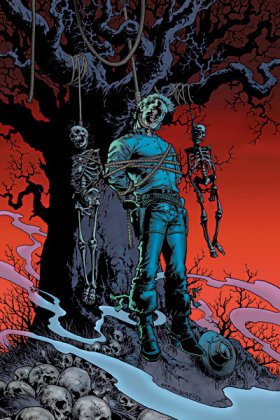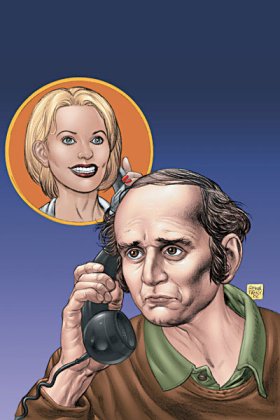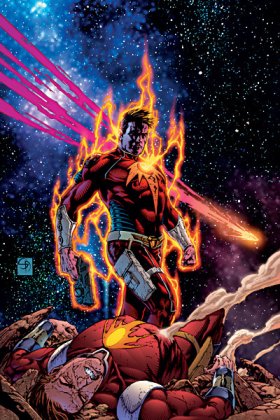|
The
Fanboy Planet Preview Spotlight 09/07/06
brought to you by FanboyPlanet.Comics
of Santa Clara
Each
week we look through the upcoming releases to offer our two
cents as to what's hot and what's not. You can agree with
us or not, but spend your money wisely. Jonah
Hex #11
writers: Justin Gray & Jimmy Palmiotti
artist: David Michael Beck
A couple of
weeks ago, a co-worker asked me why they're called "comics"
if they're not funny. I gave a typically long-winded answer
about it referring to an art form that started out being
just humor before branching into a variety of other genres.
I'm not going to backtrack and say that Jonah Hex
is comic, though it has moments of humor. However, I realized
that as much as I get into a variety of different books,
the ones I keep gravitating back toward, regardless of genre,
are the ones that I consider fun, if not funny.
Jonah Hex
qualifies way more often than not, and because Gray and
Palmiotti keep pulling each issue off as a stand-alone story,
though definitely woven into a larger tapestry, it's a book
that anybody can pick up. You can pick it up for the first
time and have as much fun, I hope, as I did reading this
issue.
Guest-starring
El Diablo, this issue alludes to events in the first issue,
but again, the writers recap enough information that new
readers won't be lost. They've also got the art down of
not making it awkwardly expository; instead, the circus
freaks out to see Hex swing from "The Hanging Tree" only
reference the earlier story enough to explain their motivation
to the gunslinger. Sure, lots of people want Hex dead, but
they've all got their reasons.
What Hex had
done, though, was a righteous act, and most of these circus
folk are uneasy about their brand of justice. That earlier
story illustrated a piece of Hex's moral code. This story,
however, illuminates a different side of the scarred cowboy.
Though he won't admit it, Hex has need of friends.
It's poignant
and subtle, burrowing into his gruff exterior. But what
pushes the book into outright fun territory is that his
friends are all DC's Western heroes from the sixties and
seventies.
Taking El Diablo
back from Vertigo, Gray and Palmiotti have fleshed out the
character a bit more. He's a cursed man, but still capable
of living a life of sorts. In a few panels, they make Lazarus
Lane into a fully-fleshed character, a perfect foil for
Jonah Hex and definitely at odds with his supernatural alter
ego. With this issue, the writers also tie him more strongly
into the modern-day El Diablo, who recently appeared in
Infinite Crisis after years of inaction. (As a side
note - DC, collect that Gerard Jones/Mike Parobeck series.
It was ahead of its time.)
David Michael
Beck steps in on the art chores and it's an impressive job.
Fully acted, neatly staged, the art is just busy enough,
rewarding a couple of read-throughs. It's also pretty life-like,
capturing the thoughts of its characters and doing a good
job of contrasting the dirt of the frontier with the efforts
of people like Lane to keep clean.
It was a good
week for comic books. But none gave me the smile that Jonah
Hex did.
Also on the
Stands:
American
Splendor #1: Harvey Pekar gets some Vertigo money. If
you're already a fan, you're already planning to buy it.
But if you don't know Harvey's work, or only know the movie
from a few years back, now is the time to give him a try.
His honesty - especially towards himself - is strangely
compelling. Clearly, the great artists that jump on board
to illustrate him agree.
The Cross
Bronx #1: It's amazing how effective Michael Avon Oeming's
somewhat cartoony style can be at portraying gore. Yep,
it's still gross, but it's in the service of a gritty police
story that may or may not have a smack of the supernatural.
Detective Rafael Aponte carries the visible weight of the
world on his shoulders as he seeks out something he hasn't
in quite a while: justice.
Emissary
#4: Credit Jim Valentino for trying, but every time
Emissary goes somewhere new, it steps back into the
obvious for twice as many pages. Somewhere in here is an
honest attempt at an adventurous meaning of life story.
More often than not, the characters come across as flat
and behaving according to stereotypes.
Jack Staff
#11: So…hard…to…follow. And yet so cool. Paul Grist's
art and storytelling have a nice cleanness. How it all ties
together is confusing at this point, but the mini-stories
(which appear randomly and disappear whence they came) at
least maintain an interior logic. It's not for everyone's
taste, and I don't know if this is some sort of experimental
narrative or just how British comics used to work before
we took over, because that's what we always do.
Manifest
Eternity #4: Dustin Nguyen's artwork has evolved a bit,
and it gives the book a nice unique sheen. The story, however,
still doesn't feel as cool as the artwork makes it seem.
While the idea of a science fiction universe taking on a
fantasy one seems cool, this book is just moving along at
a glacial pace.
Mystery In
Space #1: Captain Comet and …The Weird? The WEIRD?!?!?!?!
Okay. Enough of that. Jim Starlin injects a little Starlin-drive
into one of DC's most overlooked cosmic characters, quickly
and efficiently establishing a supporting cast that we can
actually care about. The Weird might not be so easy, as
in his previous appearance (a mini-series with the Justice
League, drawn by Berni Wrightson), he was a character literally
in search of a personality - and that still seems to be
the case.
Noble Causes
#23: The soap opera has gotten more convoluted even
as the art has gotten less impressive. This is a book starting
to peter out, eschewing plot development for longer fight
scenes. Early issues rocked, but it's been hard to stay
interested in this one.
Sidekick
#3: Rick Veitch did it years ago with Bratpack.
But Paul Jenkins has added a couple of new wrinkles - certainly
a more modern take on the selfishness of superheroes, plus
undeniable charm that keeps trying to lift this book above
mediocrity. It's not at the top of my pile, but one worth
flipping through.
Y:
The Last Man #49: Brian K. Vaughan can't spin this thing
out forever, and indeed plans to bring it to a close next
year. But he still keeps throwing us curveballs without
letting us feel manipulated. For every answer, a new question
arises. And then characters realize they may have accepted
the wrong answer. It feels real. Maybe too real.
Hey, write to us and
let us know what you think, or talk about it on the
forums!
|








